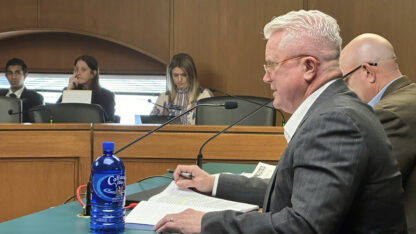Georgia House advances budget with pay raises for teachers and state workers

The Georgia House is backing a state budget that would include pay raises for public school teachers and state employees, as well as boost spending on education, health care and mental health.
The House voted 172-1 for House Bill 916 on Thursday. It would spend $36.1 billion in state money and $66.5 billion overall in the budget year beginning July 1. The measure goes to the Senate for more debate.
“This is an awesome budget that addresses the needs of Georgians from every walk of life, from every part of Georgia,” said House Speaker Jon Burns, a Newington Republican. “Thank you to everyone who voted affirmatively on this bill. It’s good to see us all work together and find some things we can agree on that benefit the people we care so much about.”
Spending would fall from this year’s budget after Gov. Brian Kemp and lawmakers supplemented that budget will billions in one-time cash, boosting state spending to $38 billion in the year ending June 30.
Public school teachers would get a $2,500 raise starting July 1, boosting average teacher pay in Georgia above $65,000 annually, as the Republican governor proposed in January. That’s in addition to a $1,000 bonus Kemp sent out in December. Prekindergarten teachers would also get a $2,500 raise.
State and university employees also would get a 4% pay increase, up to $70,000 in salary. The typical state employee makes $50,400.
Combined, that’s more than $600 million in pay raises. Teachers previously received $7,000 in raises during Kemp’s first five years in office.
Some employees would get more. State law enforcement officers would get an additional $3,000 bump, atop the $6,000 special boost they got last year. Child welfare workers would also receive extra $3,000 raises.
Many judges would also get a raise under the plan. The House proposes spending more than $10 million to implement half of a plan to raise and standardize judicial pay, with House Appropriations Committee Chairman Matt Hatchett, a Dublin Republican, saying the second half would come next year. The House would also provide $15.2 million to boost the salaries of assistant district attorneys, with Hatchett saying low salaries were contributing to a shortage of prosecutors.
Overall, Hatchett said, he believed pay increases are “moving the needle on employee recruitment and retention” for public agencies that have been seeing workers depart for higher pay.
The state would spend hundreds of millions of dollars more to increase what it pays to nursing homes, home health care providers, dialysis providers, physical and occupational therapists, and some physicians. Most increases were proposed by Kemp, but $27 million more were added by the House.
“Adequately compensating providers assures access to care,” Hatchett said.
Adults who get health insurance from Georgia’s Medicaid program would see their basic dental care covered for the first time, at a cost of $9 million in state money, or $28 million once federal money is included.
The House proposes spending $21 million more on domestic violence shelters and sexual assault response. Some of those agencies face big cuts in their federal funding. Hatchett said the money doesn’t directly offset the federal funds but said the state needs to pay for services that it mandates.
House lawmakers would spend $6.33 million to provide free breakfast and lunch at public schools to children who currently pay reduced prices, but who aren’t judged poor enough to qualify for free meals.
The budget also affirms Kemp’s plan to spend $104 million on school security and $205 million to boost the state’s share of buying and operating school buses. Representatives are also backing a plan to reverse a longstanding budget cut to the Department of Early Care and Learning, pulling prekindergarten class sizes back down to 20 children after years at 22.








